We shall require a substantially new manner of thinking if mankind is to survive. Albert Einstein
Main Navigation
Picture the Bus
Why a bus? Children in high risk areas often have no or little specialist mental health services available, limited ability to attend specialist services (expensive transport and crossing borders of territories can be associated with risk) and they sometimes live within a culture where it is not acceptable or safe to talk about, or appear to have, mental health problems. A clinic in a bus can be a simple and effective solution, and can offer many benefits, such as a safe, suitable and user friendly setting for assessment and treatment, alongside a unique and powerful tool to address stigma and inspire positive change through the atmosphere it creates.
Our aim is to change how mental health, mental illness and treatment of mental health problems are perceived and how assessment and treatment are experienced by children and families. Many children and families are fearful and suspicious of mental illness, mental health problems and mental health professionals - the best way to change this perception is to change the experience - the bus will offer the opportunity for normative and positive experiences for everyone in the community!
We recommend that three areas or communities are chosen in the host country where the service will be based. The service will go from area to area, community to community or township to township and will aim to spend three days in each area, giving time for word to spread regarding the arrival of the bus (or service if offered in a clinic). The bus or service will return to each area in two to three weeks to follow up or to continue with input.
Ideally the bus is parked in an area with space and clear views, ideally in close proximity to elders or leaders of the community, who we will liaise with before the service agreement is finalised, and the aim will be to integrate and work in collaboration with the community.
Everyone is welcome to stop by, even for an informal chat or cup of coffee. We want to create a positive experience and address stigma through experiences rather than mere words. The atmosphere will be key. Children will be encouraged to play games outside the bus with professionals and volunteers, whilst they wait for their appointment, and we will encourage staff to join in with the games or with casual, productive and educational conversations with families and adults in the area. Psycho-education regarding mental health difficulties in children and education regarding general and relevant health topics, such as immunisations, nutrition or HIV, will be a key component. Good coffee, good bread and good local music will be available.
The aim is for a casual, welcoming and positive atmosphere, but with clear boundaries and clear and common goals that inspire the highest clinical standards and safe working, containing (containing = inspiring a feeling of physical safety, emotional security, calmness, confidence, hope and well-being) children, families, communities, as well as staff offering services.
Service Aims
1. The first priority - the best interest of the child - risk management and clinical excellence
2. Developing an accessible, user-friendly and sustainable service of value for the community
3. Developing a service that is evidence based, consistently effective and of the highest quality
4. Reducing the need for expensive taxis and public transport to get to clinic appointments
5. Creating a positive atmosphere for children, families, carers, volunteers and professionals
6. Assessment and treatment of hard to reach children taking a bio-psycho-social approach
7. Liaison and consultation, working collaboratively with existing services and departments
8. Integrating into the community - building relationships and learning about need
9. Eradicating stigma relating to mental health through positive experiences and education
10. Eradicating fear and suspicion towards uniforms and professionals
11. Psycho-education regarding mental health difficulties and risk in children
12. Education regarding general health topics, such as immunisations and infectious diseases
13. Training to identify and meet mental health needs in children, alongside local professionals
14. Gathering useful data to inform research and local sustainable service development
The Professionals / The Staff (varies between 2-20 from project to project)
1. 2-4 Child and Adolescent Psychiatrists
2. 1-2 GPs
3. 1-2 Paediatricians with and without children's mental health training and experience
4. 1-2 Medical Nurses with children's mental health experience
5. 1-2 Children's Social Workers
6. 1-2 Psychologists with and without children's mental health training and experience
7. 1-2 Children's Mental Health Nurses
8. 1-2 Mental Health Practitioners with children's mental health experience
9. 1-4 Police Officers (dual role of security and community engagement - playing ball games)
10. Security Adviser and Officers (where indicated and appropriate)
11. Administrative Support
12. 1 Bus driver and Technician
We are guided by local teams in terms of need and we aim to provide the services that local teams request, providing we can safely deliver the service and we have sufficient funding. The professional combination, along with local and international volunteers offering non-clinical input, will vary from project to project depending on availability, and also from day to day, as volunteers and professionals rotate through services and projects.
We recommend that the service or bus is partly staffed by local professionals and volunteers, rotating through this service as part of their usual clinical duties. In our opinion this will inspire and facilitate collaborative work with local Children's and Health teams and organisations, and this will be a key factor in promoting sustainability.
All individuals offering services share our service goals and take an active role in interacting with children, families and the community with an approach that is positive, enthusiastic, creative, flexible, but based on experience and evidence, curious (eager to learn from children, families, professionals and non-clinical volunteers), transparent, containing and welcoming.
We recommend that three areas or communities are chosen in the host country where the service will be based. The service will go from area to area, community to community or township to township and will aim to spend three days in each area, giving time for word to spread regarding the arrival of the bus (or service if offered in a clinic). The bus or service will return to each area in two to three weeks to follow up or to continue with input.
Ideally the bus is parked in an area with space and clear views, ideally in close proximity to elders or leaders of the community, who we will liaise with before the service agreement is finalised, and the aim will be to integrate and work in collaboration with the community.
Everyone is welcome to stop by, even for an informal chat or cup of coffee. We want to create a positive experience and address stigma through experiences rather than mere words. The atmosphere will be key. Children will be encouraged to play games outside the bus with professionals and volunteers, whilst they wait for their appointment, and we will encourage staff to join in with the games or with casual, productive and educational conversations with families and adults in the area. Psycho-education regarding mental health difficulties in children and education regarding general and relevant health topics, such as immunisations, nutrition or HIV, will be a key component. Good coffee, good bread and good local music will be available.
The aim is for a casual, welcoming and positive atmosphere, but with clear boundaries and clear and common goals that inspire the highest clinical standards and safe working, containing (containing = inspiring a feeling of physical safety, emotional security, calmness, confidence, hope and well-being) children, families, communities, as well as staff offering services.
Service Aims
1. The first priority - the best interest of the child - risk management and clinical excellence
2. Developing an accessible, user-friendly and sustainable service of value for the community
3. Developing a service that is evidence based, consistently effective and of the highest quality
4. Reducing the need for expensive taxis and public transport to get to clinic appointments
5. Creating a positive atmosphere for children, families, carers, volunteers and professionals
6. Assessment and treatment of hard to reach children taking a bio-psycho-social approach
7. Liaison and consultation, working collaboratively with existing services and departments
8. Integrating into the community - building relationships and learning about need
9. Eradicating stigma relating to mental health through positive experiences and education
10. Eradicating fear and suspicion towards uniforms and professionals
11. Psycho-education regarding mental health difficulties and risk in children
12. Education regarding general health topics, such as immunisations and infectious diseases
13. Training to identify and meet mental health needs in children, alongside local professionals
14. Gathering useful data to inform research and local sustainable service development
The Professionals / The Staff (varies between 2-20 from project to project)
1. 2-4 Child and Adolescent Psychiatrists
2. 1-2 GPs
3. 1-2 Paediatricians with and without children's mental health training and experience
4. 1-2 Medical Nurses with children's mental health experience
5. 1-2 Children's Social Workers
6. 1-2 Psychologists with and without children's mental health training and experience
7. 1-2 Children's Mental Health Nurses
8. 1-2 Mental Health Practitioners with children's mental health experience
9. 1-4 Police Officers (dual role of security and community engagement - playing ball games)
10. Security Adviser and Officers (where indicated and appropriate)
11. Administrative Support
12. 1 Bus driver and Technician
We are guided by local teams in terms of need and we aim to provide the services that local teams request, providing we can safely deliver the service and we have sufficient funding. The professional combination, along with local and international volunteers offering non-clinical input, will vary from project to project depending on availability, and also from day to day, as volunteers and professionals rotate through services and projects.
We recommend that the service or bus is partly staffed by local professionals and volunteers, rotating through this service as part of their usual clinical duties. In our opinion this will inspire and facilitate collaborative work with local Children's and Health teams and organisations, and this will be a key factor in promoting sustainability.
All individuals offering services share our service goals and take an active role in interacting with children, families and the community with an approach that is positive, enthusiastic, creative, flexible, but based on experience and evidence, curious (eager to learn from children, families, professionals and non-clinical volunteers), transparent, containing and welcoming.
This will be an ongoing priority.
The Bus
1. Two small clinic rooms (with separate outside-leading doors and large windows) with toys and the appropriate assessment and therapeutic tools on the lower level
2. Very small reception space offering bread and coffee on the lower level
3. Very small kitchen on the upper level
4. Very small bathroom on the upper level
5. Meeting room able to accommodate 10 professionals on the upper level
6. Large canopy on the outside of the bus, providing a comfortable wind and rain protected area
The bus will have the necessary medical equipment, such as a defibrillator, first aid equipment, blood pressure machines and ideally an ECG, but cash, medication, electronics and other items of significant monetary value will not be kept on the bus.
Examples of bus conversions:
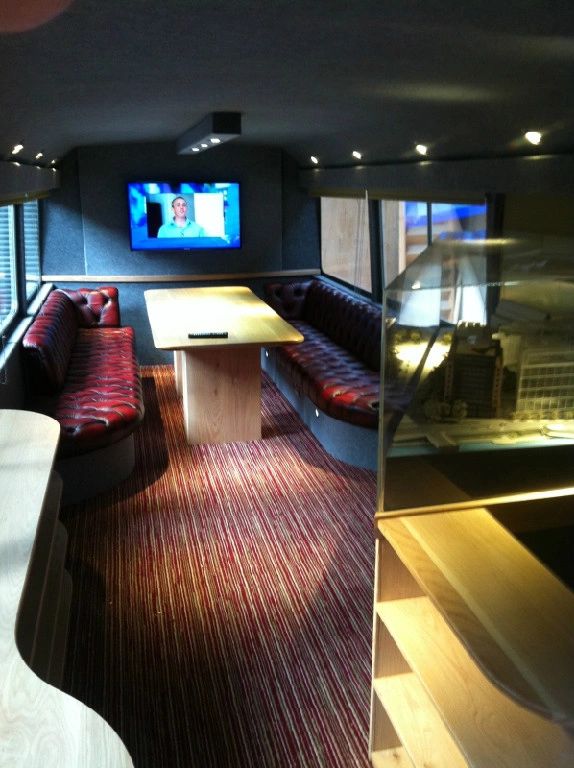
A clinic room that can also be utilised as a meeting room.
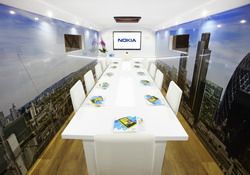
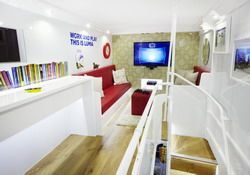
A meeting room able to accommodate 10 people with books and the opportunity for presentations on mental health topics.
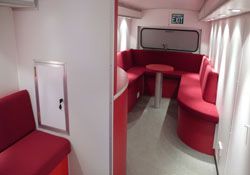
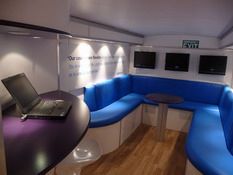
Two clinic rooms.
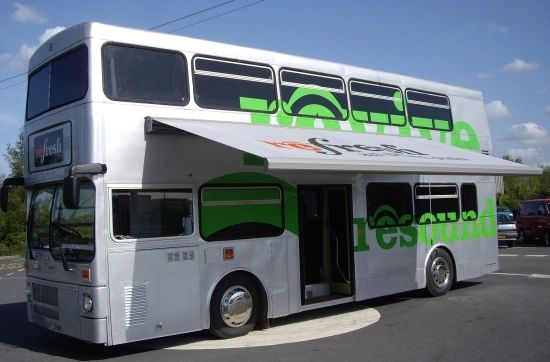
A large canopy on the outside of the bus.
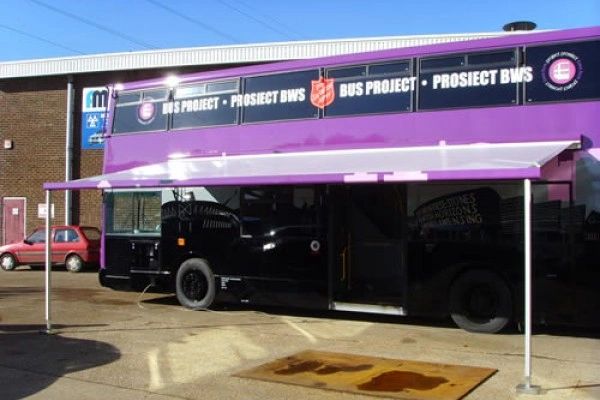
Outdoor space is a useful tool for informal assessment and education.
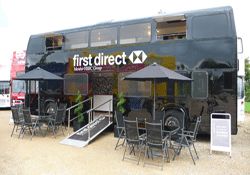
All contributors' names can be made known on our website or the outside of the bus to inspire more communities and organisations to be a part of this positive project.
We aim to regularly make detours through cities to increase exposure and to raise awareness and encourage involvement and support.
We will be happy to add your name to the bus!
The Bus
1. Two small clinic rooms (with separate outside-leading doors and large windows) with toys and the appropriate assessment and therapeutic tools on the lower level
2. Very small reception space offering bread and coffee on the lower level
3. Very small kitchen on the upper level
4. Very small bathroom on the upper level
5. Meeting room able to accommodate 10 professionals on the upper level
6. Large canopy on the outside of the bus, providing a comfortable wind and rain protected area
The bus will have the necessary medical equipment, such as a defibrillator, first aid equipment, blood pressure machines and ideally an ECG, but cash, medication, electronics and other items of significant monetary value will not be kept on the bus.
Examples of bus conversions:

A clinic room that can also be utilised as a meeting room.


A meeting room able to accommodate 10 people with books and the opportunity for presentations on mental health topics.


Two clinic rooms.

A large canopy on the outside of the bus.

Outdoor space is a useful tool for informal assessment and education.

All contributors' names can be made known on our website or the outside of the bus to inspire more communities and organisations to be a part of this positive project.
We aim to regularly make detours through cities to increase exposure and to raise awareness and encourage involvement and support.
We will be happy to add your name to the bus!
Content copyright 2021. . All rights reserved.
